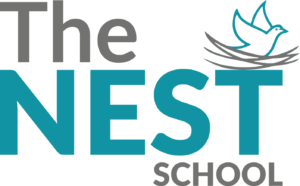We teach children how to think, not what to think.
PEDAGOGY
- Facilitate learning through joint productive activity among teachers and students.
- Develop students’ competence in the language and literacy of instruction throughout all instructional activities.
- Connect curriculum to experience and skills of students’ home and community.
- Challenge students toward cognitive complexity.
- Technology integration for blended learning
- Investigation, experimentation, and demonstration
- Interdisciplinary approach
- Engage students through dialogue, especially instructional conversation.
Discipline
Students are assessed for discipline based on their attendance, sincerity, behavior, values, tidiness, respectfulness for rules and regulations, attitude towards society, nation and others. Grading on Discipline is carried term-wise. For rules and regulations of school click hereThe NEST School targets nurturing students with sound ethical values and multivalent capabilities. This undertaking is carried out by using the virtue of a dynamic curriculum that encompasses not best educational excellence but aesthetic refinements, effective capabilities, and the artwork of dwelling. We impart schooling that is modern, based totally on abilities, and at the same time meets international standards. Our center thinking is ‘modernity mixing with subculture’.
Our school is affiliated with the Matriculation Board of Tamil Nadu and the State Board of Tamil Nadu. The curriculum as defined by Matriculation Board will be observed in letter and spirit, but, we’ve got executed an entire transformation of studying via supplying exhaustive materials primarily based on thorough studies and curating global-class and indigenous content. The technique to the development of the curriculum has been scientific and delves deeper than what is available anywhere else.


We have partnered with XSEED a global K-8 learning company headquartered in Singapore which specializes in the 5-step teaching method.
AIM – Clarify the outcome of every lesson so students know beforehand what they will learn.
ACTION – Perform an activity to experience concepts first-hand & understand their use and application in real life.
ANALYSIS – Reflect on the experience & ask probing questions to uncover and understand the concept further.
APPLICATION – Practice solving real world problems in the workbook to solidify understanding and build skills.
ASSESSMENT – Get real-time feedback across conceptual understanding, applied thinking & English language fluency in order to improve performance.

Foundation Phase
Children are naturally curious about their surroundings. Teaching them in a way that is consistent with this desire to read, as well as increasing their understanding of the topic and their ability to read, write, and think is like success. When the students’ interests are kindled, they enjoy spending time investigating concepts and can be more easily motivated to take part in language arts and math activities.
Emphasises on the development of the whole child.
- Songs and poetry teach rhythm, pitch, and balance.
- A love for one’s natural and cultural environment blossoms through interactions with the real world.
- Scribbling, drawing,colouring, painting, origami, and other craftwork hones the cold’s aesthetic sense
- Numeracy and mathematics skills are built by observing order patterns and relationships, cause and effect, abstract symbols and concepts of time, space, and quantity in the universe.
- Self-awarness grows throws prayer and reflection.
- Group work with both peers and adults builds confidence and positive relationships.
- Sand play, water play, dance, drama, and yoga promote the development of fine and gross motor skills.
Assessments
- Offers a sign of the strengths and weaknesses of every kid to the teacher for personalisation of the educational program.
- Identifies the individuality of every child and permits for variations in types of learning.
- Feedback regarding child’s skills, likes and dislikes.
- Includes comprehensive writing covering all the areas of development.
Primary Phase
The Curriculum caters to a varied and diverse range of individual differences, intelligence, and abilities and provides a plethora of opportunities to enjoy the learning experience through the integration of generic skills and values in key learning areas. Integration and adaptation of the best available international teaching and learning practices.
Assessments
- Project/Skill based Internal Assessment
- Written Assessment
Middle Phase
As the learner has gained mastery over basic concepts underlying each subject area in the primary years, the learner is now ready to meet the rigors of the academic program in the secondary section aligned with the board Examinations. The focus shifts to self-reliance and initiative with purposeful, goal-directed facilitation by the teacher. Opportunities are therefore created for questioning, enquiry, debate, reflection, and deep-diving into the concepts.
Assessments
- 1 Formative and 1 Summative Assessment.
- Internal Assessments – Project/Skill based
Senior Phase
The Senior Wing of the school strives to maintain excellence in academics to enable the students to stand at par in today’s competitive world. The pattern we follow ensures holistic development of the students encapsulating scholastic and co-scholastic aspects including life-skills, attitudes and values, performing arts, health and physical education.
Assessments
- 1 Formative and 1 Summative Assessment.
- Internal Assessments – Project/Skill based

